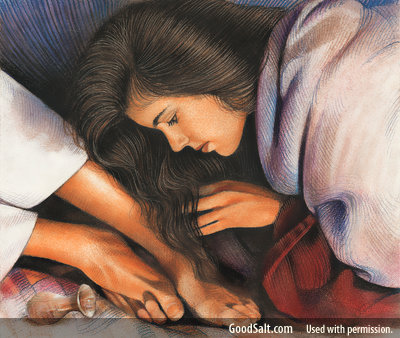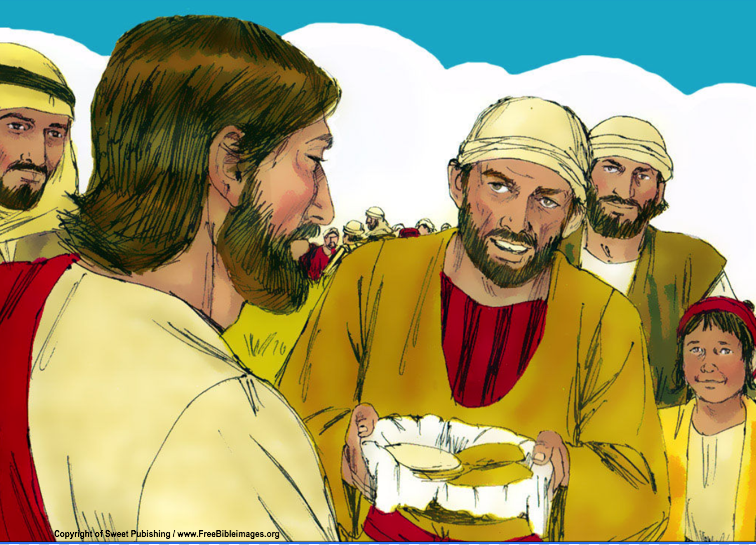“Then Mary took a pound of very costly oil of spikenard, anointed the feet of Jesus, and wiped His feet with her hair. And the house was filled with the fragrance of the oil.” John 12:3
So far in our study of John 12:1-8, we have learned to honor only Jesus by serving Christ out of thanksgiving for what he has done (John 12:1-2a) and by spending time with christ out of joy for his gift of salvation (John 12:2b).
The third way to honor only Jesus is to SACRIFICE FOR CHRIST OUT OF LOVE FOR HIM (John 12:3). What happens next is an amazing expression of love toward Jesus. “Then Mary took a pound of very costly oil of spikenard, anointed the feet of Jesus, and wiped His feet with her hair. And the house was filled with the fragrance of the oil.” (John 12:3). I can picture Mary quietly arising from her couch to walk around the other couches with people reclining on them and reaching down to pour “this pound of very costly oil of spikenard” on Jesus’ feet which were propped up on the couch. The value of this ointment was equivalent to a year’s wages (12:5).
This perfume was very expensive for several reasons. First, because of the large quantity that Mary used. A “pound” was the equivalent of a Roman pound or approximately twelve ounces. Mary had enough anointment to not only anoint His feet, but His entire body. In fact, Matthew and Mark indicate that she also anoints Jesus’ head perhaps to focus on honoring Him (Matthew 26:7; Mark 14:3). John may have reported Mary anointing Jesus’ feet to draw attention to her humility and devotion in contrast to the pride of the Sanhedrin and disciples (cf. John 11:47-53, 57; 13:1-17). 1 It is likely then that Mary anointed both Jesus’ head and feet.
Secondly, this was costly ointment because of its quality. John reports that it is “pure spikenard” in contrast to ointment which had been diluted. 2 A third reason why this perfume was costly is because it was made from the nard plant in East India and imported from there. 3 It is normally shipped in a sealed alabaster jar and would only be broke open for very special occasions. Because this ointment was so expensive, only the wealthy could afford to buy it. It was usually reserved to be given to kings. Mary wanted to give Jesus the best ointment because of her love for Him. Nothing was too good for her Lord.
Do you treasure the Lord Jesus more than your possessions or money? Does your spending of money reflect that Jesus is first in your life? If others looked at how you spend money, would they conclude that you love Jesus more than anyone or anything else?
Mary “anointed the feet of Jesus” with this costly perfume. Normally a Rabbi’s head would be anointed with such perfume. To tend to Jesus’ feet was the task of a lowly house slave or servant. But Mary chooses to anoint His feet as an expression of her humility and devotion to Christ. To use “her hair” to wipe off the excess oil from Jesus’ feet is also significant. “Normally Jewish women never unbound their hair in public, since loose hair was a sign of loose morals.” 4 But Mary did not seem to care what others thought at this moment. Her heart went out to her Lord and she expressed her feelings of gratitude for Him raising Lazarus from the dead.
Do you love Jesus more than your pride? Or are you more concerned about what others think of you than what Jesus thinks of you? People may think you are a religious fanatic, but what matters is what Jesus thinks about your sacrificial love for Him.
John then informs us that “the house was filled with the fragrance of the oil.” Mary’s expression of love and gratitude for the Lord filled the entire house with a fragrant aroma. I’m reminded of a Rabbinic saying: “The scent of good oil is diffused from the bed-chamber to the dining-hall while a good name is diffused from one end of the world to the other.” 5 This may be John’s way of saying that Mary’s action would be spoken of throughout the world (cf. Matthew 26:13; Mark 14:9). Her devotion and sacrifice for Christ would become a perpetual memorial of world-wide honor.
John leaves out an important detail that Mark’s account includes. Before Mary could anoint Jesus with the pure spikenard, she had to break “the flask” containing it (Mark 14:3). Christian author Watchman Nee equates the flask to our “outer man” or soul which must be broken to release “the inward man” or spirit (2 Corinthians 4:16). 6 Our outer man must be broken to allow the inward man containing the fragrance of Christ to be released.
Nee states, “God purposely used this term ‘pure’ in His Word to show that it is truly spiritual. But if the alabaster box is not broken, the pure spikenard will not flow forth. Strange to say, many are still treasuring the alabaster box, thinking that its value exceeds that of the ointment. Many think that their outward man is more precious than their inward man. This becomes the problem in the Church. One will treasure his cleverness, thinking he is quite important; another will treasure his own emotions, esteeming himself to be more advanced than other people. Others highly regard themselves, because they feel they are better than others, their eloquence surpasses that of others, or their quickness of action and exactness of judgment are superior, and so forth.
“However, we are not antique collectors; we are not ‘vase’ admirers; we should be those who desire to smell only the fragrance of the ointment. Without the breaking of the outward, the inward fragrance will not come forth. Hence, not only do we individually have no flowing out, but also the church has no living way. Why then should we hold our inner man to be so precious, especially if the outward only contains the fragrance, instead of releasing the fragrance?
“The Holy Spirit has not ceased working. He makes sure one event after another and one difficulty after another come to us. These disciplinary workings of the Holy Spirit have but one purpose – to break our outward man so that our inward man may come through. Yet here is our difficulty – we fret over trifles, we murmur at small losses, and we complain about insignificant things. The Lord is ever finding and preparing a way in order to use us. Yet when His hand slightly touches us, we begin to feel unhappy – even to the extent of quarreling with God and having a negative attitude. Since the time when we were saved, we have been touched by the Lord many times in various ways – all with the purpose of breaking our outward man. Whether we are conscious of it or not, the aim of the Lord is to break this stubborn vessel called our outward man.
“Nevertheless, the Treasure is in the earthen vessel (2 Cor. 4:7). But if the earthen vessel cannot be broken, who can see the Treasure within? Have we seen what is the final objective of the Lord’s working in our lives? It is to break open this earthen vessel (2 Cor. 4:7), to burst open our alabaster box (Mark 14:3), to crack open our shell (John 12:24). The Lord longs to find a way to bless the world through those who belong to Him. Brokenness is the way of blessing, the way of fragrance, the way of fruitfulness. But, it is also a path sprinkled with ‘blood from our wounds.’ Yes, there is blood from the many wounds we suffer. When we offer ourselves to the Lord for His service, we cannot afford to be lenient and spare ourselves. We must allow the Lord to crack open our outward man utterly so that He may find a way for His working through us.” 7
Does our devotion and sacrifice for Christ fill the place we occupy with a fragrant aroma? Does our praise please the Lord? Does our lifestyle honor the Lord (Hebrews 13:15-16) and emit the beautiful fragrance of Jesus (2 Corinthians 2:14-16)? What kind of odor does our devotion to Christ emit? Is it pleasant or unpleasant? Unbearable or refreshing?
We all have reason to live for the Lord. Mary was thankful that Christ raised Lazarus from the dead physically. But Jesus has done even more for us! He has raised each of us who believe in Him from the dead spiritually. He has given us never-ending life and guarantees to resurrect us from the dead in the future (John 11:25-26)! Only Jesus could motivate a person to do what Mary did. What a wonderful Savior we have!
Prayer: Thank You, Lord Jesus, for drawing my attention to what honors You! Mary gave to You what was most precious to her as a way of thanking Your for raising her brother from the dead. But it also seems that she wanted to bless You before Your upcoming crucifixion. She seems to understand, at least in part, what you were about to face at the cross, and she wanted to minister to You while You were still with her. Lord, I must admit that my love for You is so pale compared to Your love for me. Nevertheless, I want to express my love to You by giving You what is most precious to me – my family, my dreams, and my time. You are worthy of my very best. As I look back on my life, I can see You at work breaking my outer man to release my inner man containing Your fragrance. I am beginning to understand how much You want to bless this world through my own brokenness. Help me not to resist this process, but to surrender to You so more people can enjoy Your fragrance and be drawn to You. In Your powerful name I pray. Amen.
ENDNOTES:
1. Donald A. Carson, “Current Source Criticism of the Fourth Gospel: Some Methodological Questions.” Journal of Biblical Literature 97 (1978):411-29.
2. While the New King James English translation omits the word “pure,” John does include it (pistikēs) in his Greek text.
3. W.E. Shewell-Cooper, “Spikenard,” in the Zondervan Pictorial Encyclopedia of the Bible, ed. Marrill C. Tenney (Grand Rapids: Zondervan, 1975), 5:502.
4. Dr. Tom Constable, Notes on John, 2015 Edition,pg. 213.
5. William B. Silverman, The Sages Speak: Rabbinic Wisdom and Jewish Values (Northvale, New Jersey: Jason Aronson Inc., 1995), pg. 72.
6. Watchman Nee, The Release of the Spirit, (New York: Christian Fellowship Publishers, 2000) pp. 12-17.
7. Ibid., pp. 14-16.



